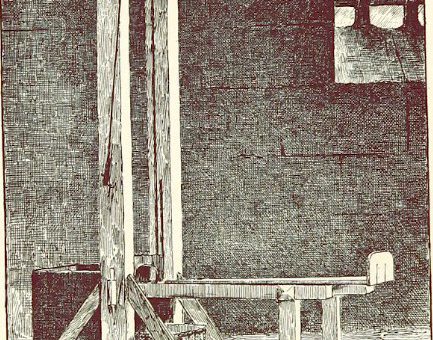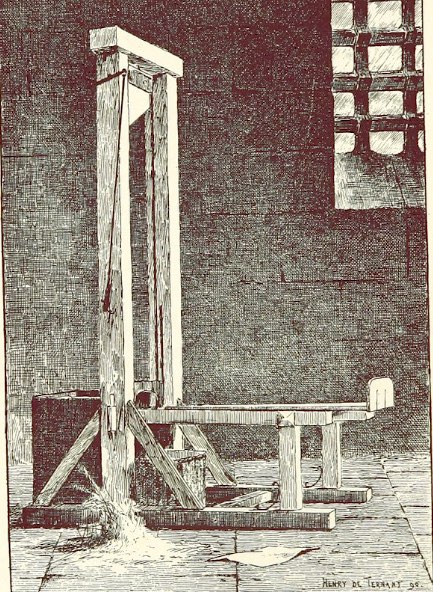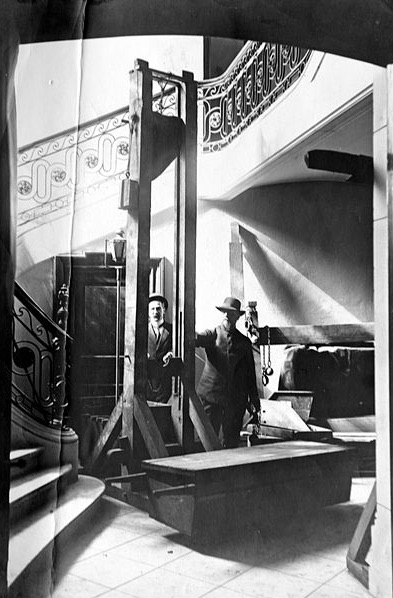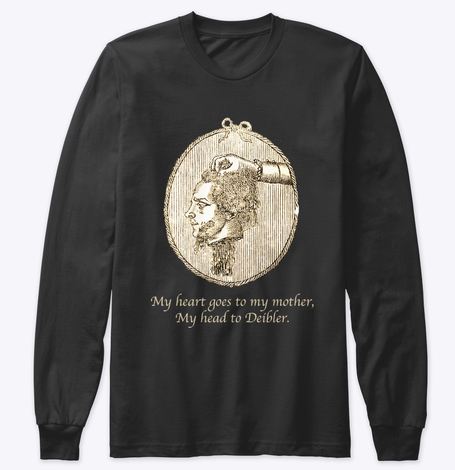
There is no denying that the guillotine made fast work of executions and that Deibler and his assistants made the executions run smoothly, with little drama.
The fascinating report below details the executions of a gang of four men, who were beheaded, one after the other, in 1909.
The Guillotine at Work
A telegram from Bethune, in North France, dated January 11, says: This morning at dawn the guillotine appeared again in France, and the four men whose death warrant was signed by President Fallieres on Saturday were led out to execution.
It was a gloomy morning, by a crowd of some 30,000 people had assembled in the square outside the gaol where the execution took place. The law of France prescribes public executions.
All night long the people had been gathering. At midnight there were 2,000 watchers in the square, and the main street of the town was crowded as on the eve of a fete.
Soon after midnight men brought ladders and benches to the square and mounted them to obtain an uninterrupted view. Others climbed into the branches of trees where their presence was revealed by the glow of cigarettes and pipes in the dark among the branches.
As the hours went by, the crowd increased steadily. Trains bringing spectators arrived from all the large towns in the neighborhood, and even from Paris. All the hotels were crowded, and in the cafes people passed the night drinking and discussing the exploits of the four doomed men, the leaders of “the bandits of the north.”

The Guillotine Goes Up
At 4 o’clock in the morning, Deibler, the public executioner, and his four assistants erected the guillotine on the prearranged site.
The troops had trouble in keeping back the crowd who wished to examine the instrument at close quarters.
The Widow’s Husbands
Meanwhile the four victims, Abel Pollet and his three accomplices, August Pollet (his brother), Canut-Vroman, and Theophile Deroo, were still ignorant of their approaching end.
Each man had been found guilty of three murders. Abel Pollet had confessed of his own accord to participation in no fewer than 250 crimes, including several murders. His accomplices, to judge from their confessions, were scarcely his inferiors in crime.
Prepared for Execution
At 25 minutes to 6, the Public Prosecutor entered the condemned men’s cells and said to them in the traditional formula, “I regret to inform you that the President of the Republic has rejected your appeal for mercy. You must prepare for the extreme penalty. Have courage.”
“Courage I have always had,” replied Abel Pollet.
He and his brother accepted the ministrations of a priest, their two comrades having previously received religious consolation. In bidding farewell to the priest who officiated, Abel Pollet thanked him and begged him to take care of his wife and children. “If I had listened to my wife’s advice,” he said, “I should not be here now.” This was the only indication of remorse that he displayed.
The prison barber was then summoned, and in accordance with Deibler’s instructions, shaved the prisoners’ necks and ripped off their collars.
Canut-Vroman asked for a cordial, and was given a large glass of brandy, but on the whole all four men maintained their courage.
The Final Moment
At 25 minutes past 7, Deroo was led out to execution. He was dressed only in shirt and trousers, and was bare headed.
As Deroo appeared, his face was livid and he walked feebly with short steps, being shackled around the ankles. There was a painful silence and then an outbreak of hoots and curses. For a moment, Deroo hesitated, but he was quickly hurried forward and flung face downwards on the plank of the guillotine.

Deibler released the knife, there was a flash, a sudden jarring sound, and all was over. The head fell into a basket in front of the knife, while the trunk was hastily flung into another basket at the side.
All the savage instincts of the crowd appeared to be aroused. There were frantic shouts of “Death! Death!” mingled with curses. The officers of the troops shouted to their men to stand firm against the crowd.
The guillotine was quickly cleaned, and Canut-Vroman was brought forward. He showed no sign of flinching. A moment later his head lay in the sawdust and the crowd was giving vent to fierce cried of exultation.
August Pollet came next. He fought and screamed.
Last of the four came Abel Pollet, the leader of the gang. The crowd’s excitement now reached its climax. The people yelled, hissed, and shouted abuse.
His head fell and there was a savage rush on the part of the crowd, which seemed bent on tearing the corpse to pieces. The troops did all they could do to restrain the public frenzy.
Just before leaving his cell, Abel Pollet wrote a letter of thanks to the governor of the prison, his handwriting being firm and regular.
The whole terrible scene was completed in eight minutes.
Source: The Advertiser (Adelaide, SA). Saturday, February 20, 1909.


